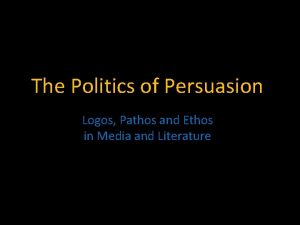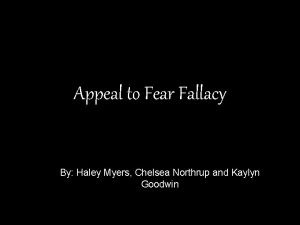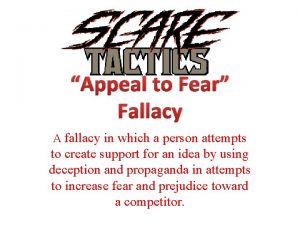Appeal to Fear Scare Tactics Scare tactics try






- Slides: 6

Appeal to Fear/ Scare Tactics Scare tactics try to frighten people into agreeing with the arguer by threatening them or predicting unrealistic dire consequences

Universal Example Many smoking commercials demonstrate scare tactics. http: //www. youtube. com/watch? v=5 z. WB 4 d. LYCh. M MLA: ”CDC Tips From a Former Smoker. ” Youtube, 15 March, 2012. Web. 20 April, 2014.

“You will confess or I will take you out and whip you to your death Tituba. ” (act 1, P. 188) This quote is said by Parris when he is trying to make Tituba confess. The problem with this argument is that if she does not confess he is not really going to whip her to death she will be hanged for witchcraft anyway.

“ There is either obedience or the church will burn in hell. ” ( act 1, P. 181) Parris uses this statement to try and create some sort of peace within the church. The problem with this argument is that the church’s obedience nor his opinion will decide if the church goes to hell or not.

“ Let either of you breathe a word, about the other things, and I will come to you in the black of some terrible night and I will bring a pointy reckoning that will shudder you. ” (Act 1, Pg. 175) This is the beginning of the play when Abigail tells the girls to mention nothing of them dancing in the woods. Although Abigail might try and get revenge if they tell, she is saying that she has the power to come and kill them, which she does not.

“You will give me your honest confession in my hand, or I cannot keep you from the rope. ” (Act 4, P. 240) When Danforth speaks this line it seems that he is being truthful in his argument, but in reality he would keep him from being hanged without the written confession. Danforth has the power to convince the court to not hang him because he had heard Proctor’s confession.









